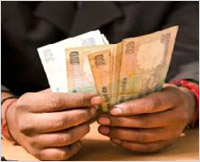Greek tragedy continues, Re falls to all-time low of 54.5
TNN
 Mumbai, 17 May 2012: The Indian currency’s Greek tragedy continued on Wednesday, as the rupee closed at a new all-time low of 54.5, marking a 22% fall already this year.
Mumbai, 17 May 2012: The Indian currency’s Greek tragedy continued on Wednesday, as the rupee closed at a new all-time low of 54.5, marking a 22% fall already this year.
All Asian currencies, not just the rupee, have lost value against the dollar due the euro-zone crisis triggered by Greece’s imminent exit from the common currency. But that is unlikely to be of much consolation to households that are set to suffer the effects of inflation as all imports, including oil, get costlier. Outbound tourists and students too will have to shell out more rupees for the same amount of dollars.
The falling rupee will also have an impact on businesses. "This could be a death blow for various Indian companies. One key aspect is the impact on Indian companies in terms of the mark-to-market losses on the borrowings they made through ECB and FCCB routes," said Jagannadham Thunuguntla, strategist and head of research at SMC Global Securities. He pointed out that the 22% drop has imposed an additional burden of $6.6 billion on Indian corporates that have borrowed money overseas. Accounting laws require companies to make provisions on foreign exchange losses on a quarterly basis.
On Wednesday, the Reserve Bank of India lost a crucial battle to keep the rupee within earlier support levels as the domestic currency lost 70 paise from Tuesday’s close. Dealers said that having crossed the previous low of 54.3, the rupee is now in uncharted territory.
Although the root cause was global, dealers said the RBI’s hand was weakened due to the government’s inability to come out with policy measures to attract fund inflows or reduce the deficit.
"More than the rupee weakening it was the euro collapsing and the dollar gaining against all currencies. Although RBI managed to pull back the rupee to 53.8 on Tuesday, overnight there was news that the Greek president had failed to avert a repeat election (raising the possibility of a Greek exit from the euro) which resulted in the rupee opening below 54," said Harihar Krishnamoorthy, treasurer, First Rand Bank. He added that although the rupee rallied briefly when finance minister Pranab Mukherjee spoke about austerity measures, it slipped again when no announcements were forthcoming from the government.
"This is not unique to India, we are part of a global economy," said K R Kamath, chairman, Punjab National Bank.
According to data compiled by Bloomberg, the ringgit slumped 1.1% in Kuala Lumpur, the Korean won dropped 1%, the Philippine peso weakened 0.9% and Thailand’s baht fell 0.5%. "Though measures like dollar bonds, creating a special window for dollar sales to the oil companies and enhancing the debt limit for foreign institutional investors apart from physical intervention may curb short-term losses, structural reforms and greater commitment by the government towards fiscal discipline are key for ensuring sustained gains in the rupee," said Upasna Bhardwaj, economist, ING Vysya Bank.




 Write Comment
Write Comment E-Mail To a Friend
E-Mail To a Friend Facebook
Facebook Twitter
Twitter  Print
Print 














